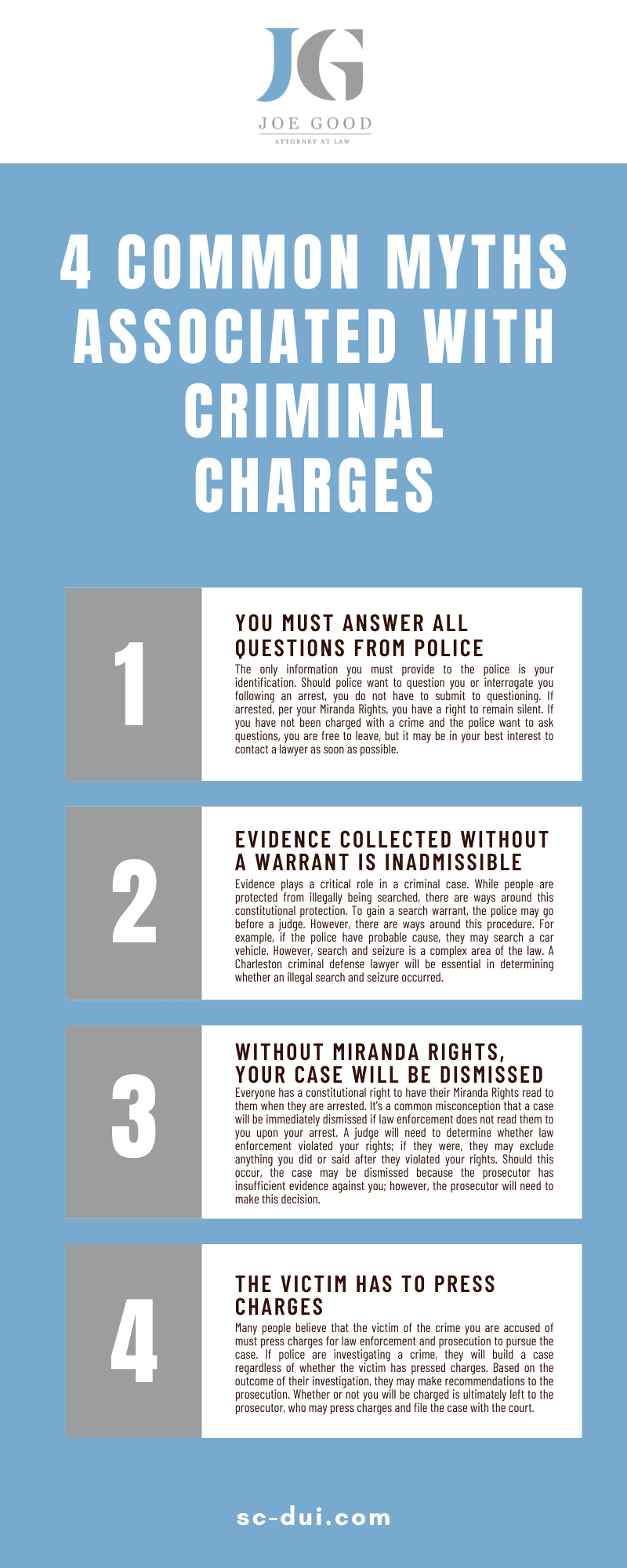Criminal Defense Lawyer Charleston, SC
 Unless you work in South Carolina law enforcement, you may not realize that there is a legal difference between the charges of burglary and robbery. Many people think that theft is theft and use the two words interchangeably, however, there is a definite legal difference between the two. If you have been charged with any form of theft, a criminal defense lawyer in Charleston, SC can help.
Unless you work in South Carolina law enforcement, you may not realize that there is a legal difference between the charges of burglary and robbery. Many people think that theft is theft and use the two words interchangeably, however, there is a definite legal difference between the two. If you have been charged with any form of theft, a criminal defense lawyer in Charleston, SC can help.
- Property Crimes
- Four Common Myths Associated With Criminal Charges
- 4 COMMON MYTHS ASSOCIATED WITH CRIMINAL CHARGES INFOGRAPHIC
- Charleston Criminal Defense Law Statistics
- 4 Contact Joe Good, Attorney at Law Today
Property Crimes
Both burglary and robbery are classified as property crimes, meaning they require theft of property from the victim or an unlawful entry with the intent of theft of property. In order to understand what the differences are, we first have to understand what the legal definition of theft is. Under the law, theft is the act of taking another person’s property without their consent.
Robbery is taking another person’s property by using a threatening force. It is defined as intentional and requires person-to-person contact.
Burglary is defined as the unauthorized entry into a person’s property in order to commit any number of offenses. Burglary does not have to involve theft as robbery does. The intent of the offender who is committing burglary could be to vandalize the property or it could be to commit a violent act.
If the offender is caught, they often face additional charges besides burglary depending on what other types of acts they committed. Burglary does not require person-to-person contact. Burglary is also not used when the theft or attempted theft is a victim’s vehicle.
Deciding Which Charge Will Be Filed
Each offense requires certain elements. For example, robbery does not require the offender to enter a victim’s property, while the crime of burglary does. The crime of robbery requires the offender to threaten the victim with harm, while the crime of burglary does not even require the victim to be present.
The penalties for burglary and robbery vary, depending on the circumstances, but both types of crimes are considered serious and carry harsh punishments if convicted. Both burglary and robbery are usually divided into different degrees of severity which are determined by several factors, including the type of weapon used and whether any victims were injured.
Both types of crimes are usually considered felonies and can carry significant prison sentences and expensive fines.
The penalties for robbery are typically pretty much the same in each case, with the severity of sentencing dependent on the type of weapon used. In the case of burglary, the courts may look at several factors when determining the sentence, including:
What type of crime did the offender plan to commit or did commit once inside the property?
- Was the offender armed with a weapon?
- What type of building did the crime take place in?
- Was the building occupied at the time of the crime?
Are You Facing Charges?
If you have been charged with burglary, robbery, or any other type of theft charge in South Carolina, you need an aggressive Charleston criminal defense lawyer representing you. Call Joe Good, Attorney at Law to schedule a free and confidential consultation and find out how we can help.
What You Should Avoid If You Are Fighting Criminal Charges
If you were recently charged with a crime, you may feel nervous and stressed. Although dealing with criminal charges is difficult, it is important to remain calm and take the necessary steps to fight your charge. Here are several actions you should avoid:
- Talking to the police. After you are detained, the police will probably want to speak to you about your case. Even if they seem like they want to help you, do not trust them. They only want to talk to you to find information to use against you. You are under no obligation to talk to the police. Politely decline to discuss your case with the police.
- Contacting the alleged victim. Some people charged with crimes make the mistake of contacting the alleged victim to make amends. This is not a good idea. You might think that you can solve the issue by apologizing, but it may actually hurt your case. If you apologize, you are admitting guilt.
- Discussing your case with family and friends. When you are dealing with something as stressful as criminal charges, it is understandable that you may want to talk to your family and friends. You may want a shoulder to lean on. However, it is not advisable to share information about your case with anyone but your lawyer. If they are subpoenaed, they will be required to tell the court what you told them.
- Failing to hire a criminal lawyer. No matter what crime you have been charged with, it is critical to have an experienced criminal lawyer on your side. Depending on the type of crime you have been charged with, you might face heavy fines and prison time. Getting convicted of a crime may also leave you with a criminal record, making it difficult to secure employment. A lawyer can create a strong defense and improve your chances of a favorable outcome. He or she may also protect your legal rights and reduce your stress levels.
- Not telling your lawyer the truth. Your criminal lawyer has to know the complete truth about your case. Otherwise, your lawyer can’t help you to the best of his or her ability. Remember that your lawyer is there to help you, not judge you. You should not feel ashamed to tell your lawyer anything.
Four Common Myths Associated With Criminal Charges
Any good criminal defense lawyer Charleston, SC recommends will share that the legal process can be highly complex. The outcomes for these cases will largely depend upon the specifics surrounding the case. The criminal justice system has been played out on television and in movies for decades, leaving many with misconceptions surrounding what it’s like to come head to head with the legal system. Unfortunately, these misconceptions can become the norm because of this and those facing the criminal justice system may believe them to be true. As a result, those facing criminal charges and subsequent convictions risk bringing further harm to their cases. Our experienced lawyer, Joe Good, Attorney at Law, shares four common myths surrounding the legal system:
Myth #1 You Must Answer All Questions From Police
The only information you must provide to the police is your identification. Should police want to question you or interrogate you following an arrest, you do not have to submit to questioning. If arrested, per your Miranda Rights, you have a right to remain silent. If you have not been charged with a crime and the police want to ask questions, you are free to leave, but it may be in your best interest to contact a lawyer as soon as possible.
Myth #2 Evidence Collected Without a Warrant is Inadmissible
Evidence plays a critical role in a criminal case. While people are protected from illegally being searched, there are ways around this constitutional protection. To gain a search warrant, the police may go before a judge. However, there are ways around this procedure. For example, if the police have probable cause, they may search a car vehicle. However, search and seizure is a complex area of the law. A Charleston criminal defense lawyer will be essential in determining whether an illegal search and seizure occurred.
Myth #3 Without Miranda Rights, Your Case Will Be Dismissed
Everyone has a constitutional right to have their Miranda Rights read to them when they are arrested. It’s a common misconception that a case will be immediately dismissed if law enforcement does not read them to you upon your arrest. A judge will need to determine whether law enforcement violated your rights; if they were, they may exclude anything you did or said after they violated your rights. Should this occur, the case may be dismissed because the prosecutor has insufficient evidence against you; however, the prosecutor will need to make this decision.
Myth #4 The Victim Has to Press Charges
Many people believe that the victim of the crime you are accused of must press charges for law enforcement and prosecution to pursue the case. If police are investigating a crime, they will build a case regardless of whether the victim has pressed charges. Based on the outcome of their investigation, they may make recommendations to the prosecution. Whether or not you will be charged is ultimately left to the prosecutor, who may press charges and file the case with the court.
4 COMMON MYTHS ASSOCIATED WITH CRIMINAL CHARGES INFOGRAPHIC
Charleston Criminal Defense Law Statistics
According to Pew Research Center, only 2 percent of the almost 80,000 defendants charged with federal crimes actually go to trial. Almost 90 percent of those cases are resolved with a guilty plea by the defendant, while just under 10 percent are dismissed. Make sure you have a skilled criminal defense lawyer who will aggressively defend you and not just look to plead your case out.
Contact Joe Good, Attorney at Law Today
Criminal charges can be incredibly stressful, and there can be significant consequences on the line if convicted. Working with an experienced Charleston criminal defense lawyer will ensure your rights remain intact and that you receive the best possible outcome. Don’t hesitate to consult with a lawyer who can help defend you against the crime you have been accused of; contact Joe Good, Attorney at Law, today.
What Is the Right to Remain Silent?
Just like the name suggests, the right to remain silent means that you have the right to say nothing after being charged with a crime. Even if the police try to ask you questions about your case, do not forget that it’s within your right to say nothing. They might use several tactics to get you to admit to a crime, like lying about evidence against you and promising leniency. Do not fall for any of these tactics. Instead, tell the police that you don’t want to speak to them without a criminal defense lawyer Charleston, SC residents trust.
Should I Take a Plea Deal?
If you have been charged with a crime, the prosecution may offer you a plea deal if you agree to plead guilty to a lesser charge. Accepting a plea deal can help you avoid going to trial, but you will face some kind of penalty. Before you agree to a plea deal, you should talk it over with your lawyer. He or she can help you determine if it is worth it to take the plea deal or not.
Should I Represent Myself in Court?
Absolutely not. Although you are not required to have a lawyer for a criminal case, it is in your best interest to do so. If you do not have a legal background, you might not understand what you are truly up against. You might say or do the wrong things, making things worse for yourself. That is why you should definitely have an experienced Charleston criminal defense lawyer on your side. He or she will help you build a strong defense and protect your legal rights.
Can You Be Charged with a DUI for Just One Drink?
If you are pulled over for suspicion of drunk driving and have a blood alcohol content level of 0.8 percent or above after having one drink, you can get charged with a DUI. Your blood alcohol content will depend on several factors, such as your body weight, how quickly you drink and food in your stomach.
How Can a Criminal Record Affect Me?
Unfortunately, a criminal conviction can affect you long after you have completed your sentence. Having a criminal record can reduce your employment opportunities, make it more difficult to rent an apartment and prevent you from purchasing firearms. You may also not be able to travel to certain countries and others may lose trust in you.
What Should I Look for in a Criminal Lawyer?
First and foremost, it is important to work with a lawyer who has specialized experience in criminal law. Your lawyer should also have experience with your specific charge, whether that is a DUI or assault. He or she should be honest, compassionate and communicative. Your lawyer should provide you with frequent updates about your case and answer your questions in a timely fashion.
Client Review
“Needed an attorney for my DUI and other charges, was very professional and timely with contacting me and keeping me up to date. Was very helpful throughout the journey and even got all of my charges dismissed. I definitely recommend for anyone needing legal services in the future.”
Tyler Chance


Reviews
See What Our Clients Are Saying About Us“He is professional and very responsive.”
- Michael C.“I love the fact that he is always available to answer any questions or any concerns I may have had.”
- Michelle N.“I am forever thankful to Joe Good and I am proud to recommend him to my friends or anyone that may need his help.”
- Everett W.

Get to Know Joe
When the Unexpected Happens & Your Back's Against the Wall, We're Here to Get You Back on Your Feet-
 Relationship-Focused & Trustworthy Representation
Relationship-Focused & Trustworthy Representation -
 Extensive Education, Training, & Experience
Extensive Education, Training, & Experience -
 Available & Easily Accessible 24/7
Available & Easily Accessible 24/7





